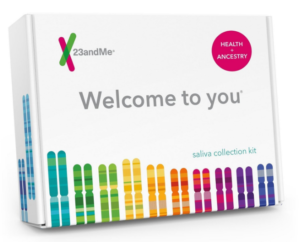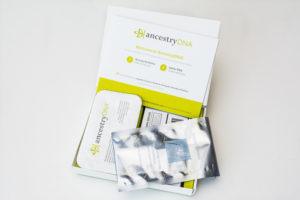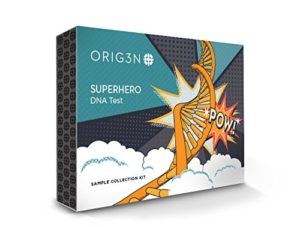A DNA testing kit can tell you about your genetic ancestry and your genetic susceptibility to diseases and health problems.
They are a key part of the broader personalized medicine movement, which involves using your personal genome to plan out health decisions and disease treatments.
Knowing your ancestry, as well as your own unique genetic mutations and variations, can clue you in on what types of diseases you are prone to get. With this information, you know what you’re up against in terms of risks to your health.
The number of companies offering DNA testing kits has exploded recently, so our research team has looked into the best labs to find out who makes the best DNA testing kit, and we’ve ranked the top ten.
These DNA testing kits can help you identify your risks for disease and the best way to plan you your exercise, diet, and supplementation routines for optimal health.
1. 23andMe Health + Ancestry

Click here for the lowest price on Amazon
23andMe is the grandfather of all DNA testing kits. Even today, every competitor is still trying to outdo this company. The DNA testing kit from 23andMe provides highly detailed feedback on your personal genetic makeup.
The Health + Ancestry kit is the one you want; it provides all of the details on your genetic heritage, plus detailed information on your genetic susceptibility to diseases and personal health.
Want to know if you’re at risk for breast cancer or Alzheimer’s disease? 23andMe tests for specific mutations linked to those conditions.
Plus, it’s got info on your genetic susceptibility to obesity, and even your athletic predisposition. With this massive array of features, it’s still number one.
2. Vitagene Unique Like You

Click here for the lowest price on Amazon
Vitagene is a health-focused DNA test kit that provides recommendations for supplements, nutrition, and exercise based on your genetic makeup.
It’s more on the overall well-being side of DNA testing kits; it doesn’t provide details on disease susceptibility.
However, the vitamin, supplement, and exercise recommendations you get are beyond what you’d find in something from another company like 23andMe. If you want health information in the medical sense, it’s not the best choice, but it is a good product if you want information on overall well-being.
3. Silverberry DNA Kit

Click here for the lowest price on Amazon
Silverberry focuses on vitamin and mineral needs in its DNA test kit. It provides information on specific nutritional deficiencies you might be prone to, as well as some behavioral and personality analysis results.
It’s not clear how valid these behavioral results are, but if you want some information on how your genetics might affect your personality or disposition, few other competitors offer that info.
4. AncestryDNA

Click here for the lowest price on Amazon
AncestryDNA is the best DNA test that focuses on providing information about your genetic heritage–i.e. where in the world your ancestors come from.
With genetic samples from over 350 regions in the world, from Congo to Sicily to Ireland, you will get a detailed report on your personal genetic heritage.
Heritage is just one step away from health–many health conditions, like certain types of cancer, show profound variation in people with different genetic backgrounds. However, with AncestryDNA, you’ll have to do the legwork yourself.
5. Fit iQ DNA Test

Click here for the lowest price on Amazon
Fit iQ is highly specialized: this DNA test focuses on how you can plan your diet and exercise program around your genetic makeup.
The results are fairly genetic; the report you get indicates your likelihood to have sugar cravings, or to respond to aerobic exercise for weight loss, for example, but there aren’t specific recommendations or concrete results.
The focus on weight and exercise is appreciated, but more details would make this a much better product.
6. myHeritage

Click here for the lowest price on Amazon
myHeritage is a DNA testing kit that’s focused on providing information on your genetic ancestry. The report you get is pretty solid, with details on the proportion of your ancestry from nearly 70 different regions in the world, but it’s not as detailed as some of the other competitors.
One advantage that myHeritage has is that their reference group (the people who provided DNA samples to make up the database your test kit is compared to) is very large, so the ancestry results tend to be quite accurate.
Still, like other reports that only provide ancestry, you’ll have to do your own research on how your ancestry relates to disease and health.
7. Geno 2.0 Next Generation

Click here for the lowest price on Amazon
The DNA testing kit from National Geographic is the ultimate “deep ancestry” tool if you’re interested in tracing back your genetic heritage.
It follows the history of your genome back up to half a million year ago. While this makes for fascinating results, it’s not particularly informative on the health front, so it is less helpful than some other competitors.
8. ORIG3N Genetic Home DNA Superhero

Click here for the lowest price on Amazon
ORIG3N Genetic Home DNA Superhero is a slick, well-packaged DNA test kit, but its results are fairly rudimentary. It tests for the presence of 24 individual gene mutations, but only some of these are related to health or fitness.
There is some basic information on muscular strength, for example, but nothing like the comprehensive reports you can get from other companies.
9. Family Tree DNA

Click here for the lowest price on Amazon
Family Tree DNA is an ancestry-focused DNA test kit, but the results you get are not as precise or reliable as some of the other ancestry-focused DNA test kits.
Because of this, and because you’ll have to do your own research on how your ancestry is linked to your risk for disease, there are better options if your top priority is finding out how your genetics relate to health.
10. TellMeGen

Click here for the lowest price on Amazon
TellMeGen is a health-focused DNA testing kit that provides detailed information on specific genetic mutations for diseases from cancer to obesity, alongside tests for whether you are a “carrier” of genetic mutations that you could pass down to your offspring.
The downside is that this test is quite new to the global market–previously, it was only available in Spain, so it might be wise to wait for more reviews to roll in before pulling the trigger on this DNA test.
DNA test kit benefits
A DNA testing kit can give you specific information on how your genetics will impact your health. While there’s a lot that you can control about your health through diet, exercise, supplements, and lifestyle choices, genetics plays a major role too.
There are specific genes that make you more likely to gain weight if you eat saturated fat, more likely to respond to an aerobic training program for weight loss, and genes that make you vastly more likely to get cancer.
A DNA test kit can give you insights into these traits and many more. By knowing your own genetic makeup, you can plan out your nutrition, supplementation, and exercise routines to better serve your long-term health.
One of the first major genetic traits to make headlines when it comes to personal health was the BRCA1 and BRCA2 genes. Women with a mutation in one or both of these genes have up to an 80% chance of getting breast cancer at some point in their life (1).
Among the general population, the chance of a woman getting breast cancer at some point in her life is only 12%. Doctors estimate that up to 10% of all cases of breast cancer could be caused by BRCA1 and BRCA2 mutations.
Because these are mutations to a single gene, this risk factor for breast cancer is easily detected by a DNA testing kit.
The serious risks associated with BRCA1 and BRCA2, combined with the ease of detecting them with a DNA testing kit, opened many peoples’ eyes to the possibilities offered by personalized genetic health planning. Soon, other diseases and health conditions demonstrated their amenability to detection by DNA testing.
Many DNA testing kits can now detect the presence of genes likely to cause celiac disease, Alzheimer’s disease, and liver disease, among others.
Beyond this, there are even tests to predict your likelihood of gaining weight or being predisposed to obesity. Initial evidence for this came from genetic research published in 1998 in the prestigious journal Nature–using a technique to sequence the entire human genome in a large group of siblings living in France, scientists flagged dozens of sites in your DNA that are linked to obesity (2).
Some of the more reliable DNA mutations have found their way to DNA tests available to consumers, and as such, these tests can predict how susceptible you are to weight gain.
They can even identify whether consuming certain types of foods, like red meat, is likely to lead to weight gain for people with your specific genetic makeup.
A natural next step might be to ask what can be done about a genetic potential for weight gain. Here, a DNA testing kit can offer insights too.
Other genetic mutations have been associated with a greater propensity to respond to aerobic exercise or resistance (i.e. weight lifting) exercise, and certain genetic traits make you more likely to respond to dietary interventions too.
A scientific article published in 2016 by researchers in Poland highlighted a number of these genes, including the ADRB3 gene, which is associated with increased weight loss after introduction of an exercise program, and variants of the LEPR gene, which are associated with decreased body fat after weight training (3).
If you find you’re susceptible to a disease, what should you do? Genetics play a role in your risk for disease, as does the environment you live in and your lifestyle.
Moreover, these effects are not separate; genetics interacts with the environment and with your lifestyle to determine your risk for disease.
This is good news, because it means you can fight back against a genetic predisposition to disease. This was highlighted in research conducted at Stanford University and published in 2018 on a group of almost 500,000 subjects (4).
Genetic data, combined with physical activity and fitness measurements like daily steps taken and muscular strength, was used to study whether people with a genetic predisposition to heart disease were able to reduce their risk of heart disease through physical exercise.
Even among those who had a high genetic predisposition to heart disease, having good aerobic fitness reduced rates of heart disease by 50%.
The same should apply to other genetic predispositions to disease. If, for example, you’re more likely to gain weight, according to your DNA testing results, you should watch your diet more closely, and think about a supplement for weight loss if you start to gain weight.
Your DNA testing results can keep you more vigilant for risks to your health, and many tests even suggest supplements and dietary changes that you can make to improve your health.
DNA testing can also help identify whether you are the carrier of a genetic disease that you could pass on to your offspring. Some genetic diseases are recessive, meaning you need two copies of the defective gene (one from your father and one from your mother).
If you and your partner both have one copy of a defective gene, neither of you would have the disease, but you could pass it on to your children.
If one of your children inherited both copies of the defective gene, they would have the disease. A similar process is at play with diseases linked to the X chromosome.
Women have two X chromosomes, so they can have a defective gene on one, but not suffer from the disease. If they have a male child, however, he will only have one X chromosome.
If that X chromosome he inherits is the one with the defect, he has a 100% chance of getting the genetic disease. DNA testing kits don’t check for all heritable genetic diseases, but they are a good place to start.
If you do find that you are a carrier of a genetic disease, getting genetic counseling along with your partner is a very prudent decisions to make before you have children.
DNA test kit risks
DNA testing kits aren’t for everyone. You should be prepared for the full knowledge of your potential health in the future, which is no small task.
Many DNA testing companies require users to sign a statement to verify that they understand the risks associated with the test.
These aren’t physical risks–a DNA test is safer than brushing your teeth. Rather, the risks are psychological. DNA testing kits use the latest science to uncover genetic mutations linked to disease, but these scientific discoveries are agnostic towards whether there’s anything to be done about them.
23andMe, for example, includes a test for four genetic mutations linked to Alzheimer’s disease. Alzheimer’s is a degenerative disease with no cure and very little in the way of treatments to slow it down.
While there are ways to reduce your risk of Alzheimer’s disease, like taking an omega-3 supplement, exercising, and staying “cognitively active” with intellectually challenging hobbies, it can still be pretty devastating to find out you have a gene that gives you a 50% chance of getting Alzheimer’s in old age.
DNA testing companies and genetic counselors emphasize the need to be prepared to know the results of tests for deadly diseases like cancer and Alzheimer’s disease.
In many cases, consulting with your doctor is a very good idea. Many women face similar difficulties with the BRCA1 and BRCA2 genes.
With an 80% chance of developing breast cancer, the results of these tests mean women who have these genes will need to be drastically more vigilant, seeing their doctor frequently and getting regular mammograms or advanced medical imaging.
Some women even elect to get pre-emptive mastectomies to prevent breast cancer after finding out that they have these breast cancer genes.
If you don’t think you’re ready to know the results of your DNA test kit, the best person to talk to is likely your family doctor. He or she can help you weigh the psychological risks of knowing your susceptibility to disease against your ability to fight back against the risks by making lifestyle changes.
Optimists might note that, even for currently incurable diseases like Alzheimer’s, there may well be a treatment or even a cure 10 or 20 years from now, and your odds of taking advantage of a treatment or a cure are higher if you detect disease early.
Your doctor can also refer you to further genetic counseling to identify what you can do about your risks for disease. Often, knowing what you are up against is half the battle.
DNA Testing Kit FAQs
Q: How do DNA testing kits work?
A: Unlike other at-home tests, like a pregnancy test or a paternity test, you don’t get the results right away. A DNA testing kit is pretty basic–all it contains is a cotton swab for a cheek wipe, or a test tube to spit into, along with a prepaid shipping label and a box.
You take your DNA sample, then mail it back to the manufacturer. There, the laboratory will sequence your DNA and analyze your results. You get a report, usually emailed to you or available online, where you can review your results.
The best companies will have your report available at any time, but some manufacturers are known to limit how long your report is available, so you should be sure to download a permanent copy as soon as you can.
Q: How long does it take to get DNA testing results?
A: The processing time varies from company to company–some of the quickest take only two weeks, while others, especially during busy times, can take well over a month.
It’s hard to predict the processing time, because it depends on the backlog that a company currently has, but a reputable DNA testing company can provide you with updates on the status of your report if you ask
Q: Why are some DNA test kit results only available for men?
A: Tests for certain genetic traits, like baldness, back hair to name a few examples, have been developed for specific genes located on the Y chromosome.
Because women don’t have a Y chromosome, they’ll never have any of these genetic traits. Some ancestry tests have a similar restriction for maternal lineage. Since they use mitochondrial DNA, which comes strictly form your mother, they can only examine your ancestry on your mother’s side.
Q: How accurate are DNA testing kit results?
A: While no DNA test is 100% accurate, as long as you follow the instructions properly when giving your DNA sample, the chance of an error in processing your information is very small.
However, genetics don’t determine everything. The health and wellness predictions made by a DNA testing kit are ultimately statistical in nature.
Take, for example, the BRCA1 and BRCA2 genes. While these increase a woman’s risk of breast cancer by a huge amount, not every woman with genetic mutations on these genes will get breast cancer.
Genes interact with the environment and with your lifestyle, so while a certain genetic trait may make you more likely to have a certain disease, or a certain health benefit, it’s not a guarantee.
Recap
DNA testing kits are already extremely valuable for planning out your health and fitness routines, and as technology advances, more genetic variants associated with health and disease will undoubtedly be identified.
A DNA testing kit can identify whether you are at risk for specific diseases, which can give you some powerful motivation to focus on lifestyle choices to improve your overall health.
You can also find out how your body is likely to respond to diet and exercise–are you more likely to respond to aerobic training like running, elliptical, and swimming, or does your body thrive on lifting weights?
You could spends months at the gym trying to figure this out by trial and error, or you could take one DNA test and find out. Because your genetics are such a powerful force in determining your health, it’s important to know your strengths and your weaknesses.
This is where a DNA testing kit can really make a difference.
https://bodynutrition.org/dna-test-kit/ http://bodynutritionorg.blogspot.com/2018/04/ranking-best-dna-test-kits-of-2018.html
No comments:
Post a Comment